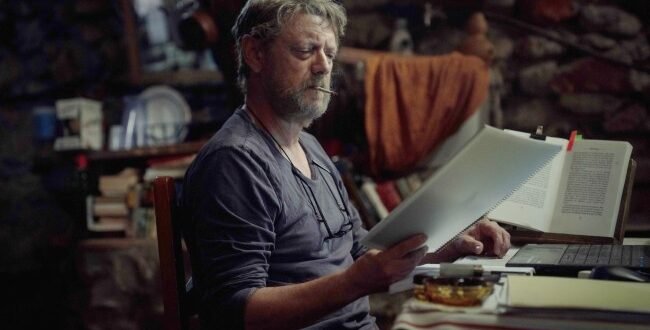“The sun is sinking in the West / The cattle go down to the stream / The redwing settles in her nest / It’s time for a cowboy to dream.”
Those immortal lyrics from Paul Francis Webster kick off one of the loveliest scenes in movie history, from one of the greatest Westerns of all time: When Dean Martin and Ricky Nelson sing “My Rifle, My Pony, and Me” in “Rio Bravo” — a glorious moment when the plot of the movie more or less comes to a halt and you just spend some time hanging out with these characters and the extraordinary talents inhabiting them. After all, cinematic artistry expresses itself through so very much more than just plot. And the pleasures of cinema so much more than just the sum of “what advances the story.”
Victor Erice clearly feels the same way and pays magnificent tribute to this “Rio Bravo” moment by staging his own version in “Close Your Eyes,” his latest masterwork, and one of the very best movies of 2024. There’s an undeniable joy in discovering this moment for yourself if you’re already a “Rio Bravo” fan, but it’s very possible that many who love “Rio Bravo” and this song won’t even know that there’s a new film that pays tribute to it in such a rich way. Now that the film is available on demand on all the major platforms (Apple, Prime Video, Fandango), it’s all the more worth firing up this beautiful reverie of a movie.
One of the many “love letter to cinema” movies in recent years — though one that’s completely unlike any other — “Close Your Eyes” follows Spanish film director Miguel Garay (Manolo Solo) as he searches once more for the lead actor of his last movie, who disappeared from the set 30 years ago and was never seen again. Was there foul play? Did he have a medical episode? Or did he just choose to walk away? Regardless, his star’s disappearance meant that Miguel was unable to finish that film, and it all but ended his filmmaking career.
But even as his direct participation in making movies is no more, Miguel still finds himself haunted by cinema, and that’s where Erice most distinguishes “Close Your Eyes” from all other “love letter to cinema” movies. It’s not about the power of being in a theater and gazing upon a big screen. It’s about how movies haunt you long after you’ve seen them — as ideas, as images that linger with you even when you close your eyes. Because images can have power even when you’re not looking at them, just as the most powerful things can be the things we don’t see.
As he journeys home from Madrid, Miguel plays with a flipbook version of “The Arrival of a Train at La Ciotat,” and he’s previously scoured an archive of celluloid prints. And if you were to ask David Ehrlich, who reviewed “Close Your Eyes” for IndieWire, that “Close Your Eyes” is shot digitally is a commentary on the gap between the luminous beauty of film (certainly of Erice’s beloved “Spirit of the Beehive”) and the dreary digital moment we find ourselves living in. “Set at the dawn of the streaming age and shot with the funereal sterility that came with it, ‘Close Your Eyes’ openly laments the loss of a more tactile film experience (the kind that included actual film), but only so that it can honor the way certain images take root inside us when seen under the right circumstances, as inextricable from our being as a soul from its body,” Ehrlich wrote.
Another way of putting it: Are the most powerful cinematic images in this streaming age still those from the pre-streaming past? Is cinephilia at its most potent now when looking backward?
When the “My Rifle, My Pony, and Me” scene occurs roughly 85 minutes into “Close Your Eyes,” Erice makes an emphatic statement about cinema’s enduring present-tense power. Miguel and a few of his friends are hanging out — much like Dean Martin, Ricky Nelson, John Wayne, and Walter Brennan in that scene in “Rio Bravo” — in the beachside hippie commune in Spain he appears to have called home for some time. Sitting around a dinner table, they talk about what to name the soon-to-be-born daughter of one of their friends, and why some of them got the nicknames they have. Miguel notes his friend is strumming on a guitar in vaguely classical way. Then, his friend asks Miguel to sing the song he loves “from the movie.” And he launches into “My Rifle, My Pony, and Me,” which, like the “Rio Bravo” original song, becomes a call-and-response duet.
They’re using a 65-year-old movie to connect in the present. Just like all cinema that came before, in a way, lives in the present. Dean Martin and Ricky Nelson have all been dead for decades, but they still live in those images, whether we watch them on a big screen or small. Anything you know about their lives outside of those images fades away: When you’re watching their movie or recalling those images in your head, they exist purely as those images and as those characters.
Anyone today who’s ever been attracted to Grace Kelly or Cary Grant watching one of their movies has felt that eternal present. Who cares that in “real life” they’ve been gone for ages? Movies always affect us in the now. Erice shows with this scene that, with movies, you never really have to look back, even as much as nostalgia is the ongoing theme of our moment. You just have to look up — or within.
Source link



